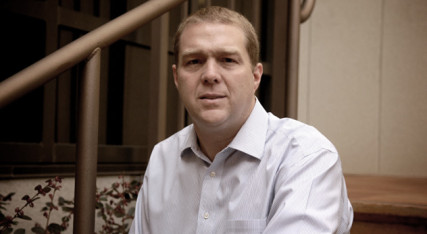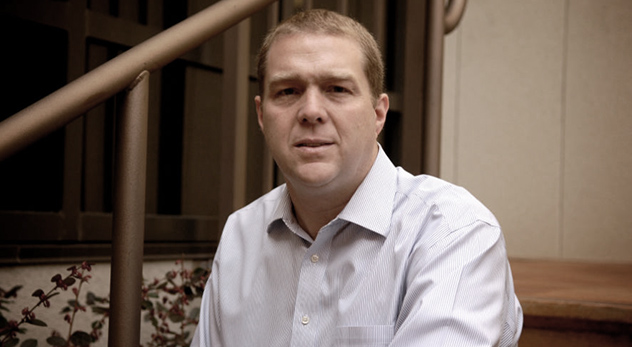
Author Johnny Carr is one of the most vocal proponents of the orphan care movement sweeping the American Christian Church.
The American Christian Church is at the cusp of an orphan care and adoption movement, and Johnny Carr is one of its most outspoken and influential proponents. In his new book, Orphan Justice: How to Care for Orphans Beyond Adopting, Carr tells readers that caring for orphans may look different than they assumed. He shares practical ways for Christians to get involved beyond simply adoption, and he urges everyone to move from simply talking about caring for orphans to actually doing something. Johnny Carr serves as Director of Church Partnerships for Bethany Christian Services, America’s largest adoption and orphan care agency. He and his wife, Beth, reside outside of Pittsburgh with their five children, three of which are adopted.
JM: You say the orphan care movement has been “reduced” to a focus on adoption. In what way is the growth of adoption non-desirable?
JC: Honestly, that was some copy that I had not actually approved – but it does make for some good areas of discussion. For many, they have equated James 1:27 with adoption. My point is, it’s only one part of the solution. The definition of orphan is the key here. When you hear the number 153 million orphaned and vulnerable children in the world, it doesn’t mean that all of them have lost both parents. The actual statistic is based on this definition: all children that have lost one or both parents. So there are children in that number still living with a parent. Two thirds of the time the father is the one that has died. In many cultures the mother and children then lose all rights (land, education, etc.) leaving them extremely vulnerable to the social ills discussed in the book. For children that need a family, adoption is always desirable but some of them don’t need to be adopted.
JM: What are practical ways every Christian should play an active role in caring for orphans?
JC: One easy way is supporting families that are adopting. Most every international adoption is now considered a special needs adoption due to the age, traumatic experiences or physical handicap of the children. It is difficult adopting children that fit in these categories. Families will need the support of their church.
Another way is starting an HIV/AIDS ministry in your church. You may not be actually working with orphans, but by making this ministry part of your church culture, you will help break the stigma that still persists that AIDS is “God’s judgment on homosexuals.” There are many orphaned children that are HIV positive and need a family. If your church is active in breaking the negative stigma, it will encourage families who are considering HIV adoption because they know that their church has a heart for this area of ministry. Other ways include recruiting foster families or Safe Families.
Internationally, there are children living in orphanages because they don’t have a birth certificate. They need it for the legal process of adoption. Our mission teams can work with local congregations to teach them how to do searches for these certificates and how to advocate for these children to make them legally adoptable.
JM: What do you say to those who feel that Americans should adopt orphans in the U.S. before adopting overseas?
JC: When someone asks me why we adopted internationally before domestically I always ask them a question before I answer: How many have YOU adopted domestically? You know, I have never had anyone ask me that question that had actually adopted a child in need here in the States. People who are in the “adoption culture” understand this. Biblically, I see this as part of our missional lifestyle. Adoption is gospel centered living. Jesus told us to go into all the world – here in our neighborhoods and to the uttermost parts of the earth. For us, we didn’t care where our child was living. We were looking for a deaf child to adopt because we are uniquely equipped to adopt deaf children (my wife is a deaf educator). It just so happens that the first two children we found available for adoption that were deaf happened to live in China. Our youngest, also deaf, was adopted through the foster care system here in the States.
JM: What is the role of the Church in orphan care?
JC: We should be taking the lead. We should be engaging the government. It’s not enough to “curse the darkness” of the foster care system; we should be bringing solutions. And guess what, we have just what they need. We have loving families that are surrounded by a group of people in their church community. But where are all the good families? I can tell you this, there are foster parents serving in the system with wrong motives and it is damaging to children. For the most part, the social workers know which families are in it for the right reasons and which ones are not. If they had waiting families in the foster system, they would choose those that would be best for the children. Many times, they don’t have them to choose from. Internationally, we should be taking the lead as well. We need to be challenging the norms of institution life and bring better ideas that are community and family based.
JM: Who else should be involved?
JC: There will always be a role for professional social workers and agencies to be involved. Adoption needs to be something that has safeguards for all involved. That would be the professional side. There is also the clinical side of helping families adjust into a new family. Many of these children have experienced horrible things in their lives. I met a couple of children in Ethiopia that had lost their parents to HIV/AIDS and they had been their caregivers. For the children with special needs, the families need to be trained in physical and speech therapy and in other ways that professionals can help.
JM: Russia came under scrutiny lately for shutting down U.S. adoptions from their country. I read that 46 active adoptions were affected – how should we feel about this? What’s a productive response?
JC: Fortunately, the last word we heard is that those 46 are going to be able to proceed to finalization. That is a good thing. But, there are many, many children stuck in orphanages in Russia and other countries that will not be adopted in the next couple of years. I am praying that the Russian church will rise up with a movement of adoption but even so, that will take a long time and that should not be done to the exclusion of international adoption. Adoption is one of the issues that most democrats and republicans can come together on. Hopefully a bipartisan group will be able to work with Russia to consider opening adoption up again to the U.S.
JM: What other issues are tied up with orphan care globally?
JC: One of the most exciting movements that I have hinted at already is the talk of community and family based care. I posted a quote on Facebook the other day from the book that reads, “God made the family for children. He never intended the growth, nurturing, and development of childhood to happen in an institution.” That quote ended getting shared over 1600 times (at the time I had 150 fans on my page). It will be a long and difficult process, but we can’t be satisfied with children living in orphanages. We just can’t. Some orphanages do good things like providing food, clothing, shelter, and even spiritual nourishment. But, it’s not the family. This is discussed in detail in the book.
JM: Your website looks like it has a lot of unique tools and resources. What will readers find there?
JC: The book is deeply personal and I wanted the readers to be able to connect with us. There are a lot of personal pictures and videos on the site that correspond with stories in the book. I have also provided links to organizations and ministries. I have not personally approved every organization listed because I think we can learn something from all of them. The part I am most excited about is the “Digging Deeper” section for each chapter. I have recorded Skype interviews with people who are working in the area discussed in the chapter. They are about 10 minutes long. I have also included more articles, papers, and other items that might help take the reader deeper into that subject.
I don’t expect everyone to agree with everything I write in the book. These are very difficult issues, but they are the “distress” (James 1:27) of orphans’ lives. We, as evangelicals, must do better in these social justice areas. So, if you don’t agree with my solutions, don’t just throw the book down and walk away, but humbly ask God what the correct approach is. How can you get involved and make a difference? James 1:27 should not be seen as a command, but a privilege.
http://www.youtube.com/watch?v=fEI9GQbFI-A







